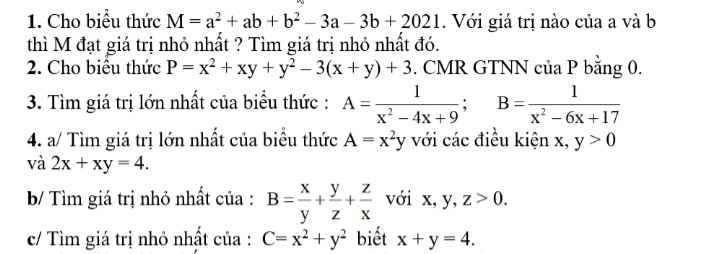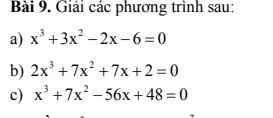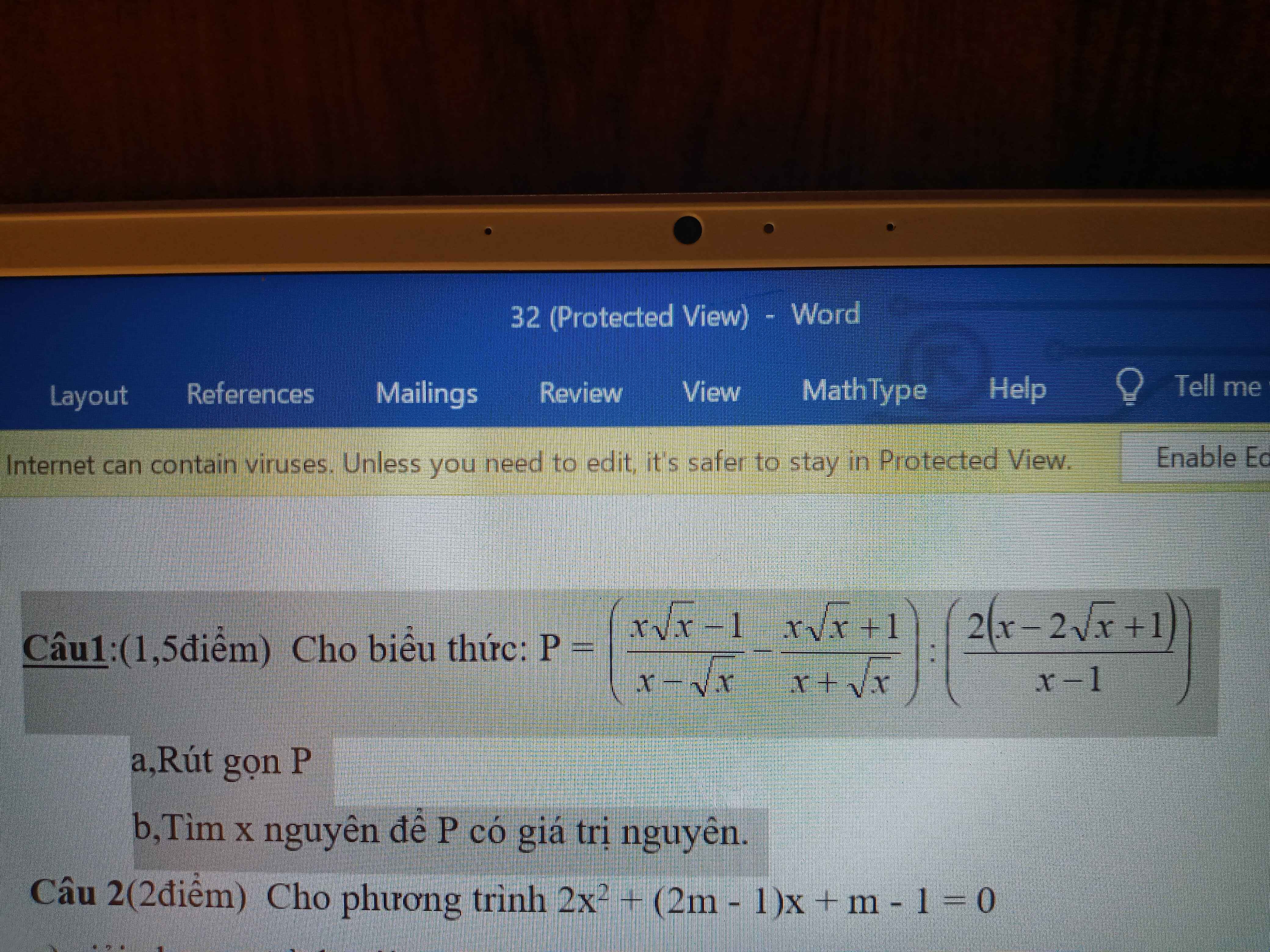
Hãy nhập câu hỏi của bạn vào đây, nếu là tài khoản VIP, bạn sẽ được ưu tiên trả lời.


8.31:
a: Xét ΔABD có AM/AB=AQ/AD
nên MQ//BD và MQ=BD/2
Xét ΔCBD có CN/CB=CP/CD
nên NP//BD và NP=BD/2
=>MQ//NP và MQ=NP
XétΔBAC có BM/BA=BN/BC
nên MN//AC
=>MN vuông góc BD
=>MN vuông góc MQ
Xét tứ giác MNPQ có
MQ//NP
MQ=NP
góc NMQ=90 độ
=>MNPQ là hình chữ nhật
=>M,N,P,Q cùng nằm trên 1 đường tròn

Bài 5:
a: Xét ΔBEC và ΔADC có
\(\widehat{C}\) chung
\(\widehat{EBC}=\widehat{DAC}\)
Do đó: ΔBEC\(\sim\)ΔADC

a) ĐKXĐ: \(\left\{{}\begin{matrix}x\le-1\\x\ge2\end{matrix}\right.\)
\(\sqrt{x^2-x-2}-\sqrt{x-2}=0\\ \Leftrightarrow\sqrt{x^2-x-2}=\sqrt{x-2}\\ \Leftrightarrow x^2-x-2=x-2\\ \Leftrightarrow x^2-2x=0\\ \Leftrightarrow x\left(x-2\right)=0\\ \Leftrightarrow\left[{}\begin{matrix}x=0\left(ktm\right)\\x=2\left(tm\right)\end{matrix}\right.\)
\(a,ĐK:x\ge2\\ PT\Leftrightarrow x^2-x-2=x-2\\ \Leftrightarrow x^2-2x=0\\ \Leftrightarrow\left[{}\begin{matrix}x=2\left(tm\right)\\x=0\left(ktm\right)\end{matrix}\right.\Leftrightarrow x=2\\ b,ĐK:\left[{}\begin{matrix}x\le-1\\x\ge1\end{matrix}\right.\\ PT\Leftrightarrow\sqrt{x^2-1}=x^2-1\\ \Leftrightarrow x^2-1=\left(x^2-1\right)^2\\ \Leftrightarrow\left(x^2-1\right)\left(x^2-1-1\right)=0\\ \Leftrightarrow\left(x-1\right)\left(x+1\right)\left(x-\sqrt{2}\right)\left(x+\sqrt{2}\right)=0\\ \Leftrightarrow\left[{}\begin{matrix}x=1\left(tm\right)\\x=-1\left(tm\right)\\x=\sqrt{2}\left(tm\right)\\x=-\sqrt{2}\left(tm\right)\end{matrix}\right.\)
\(c,ĐK:\left[{}\begin{matrix}x\le-2\\x\ge1\end{matrix}\right.\\ PT\Leftrightarrow\sqrt{x^2-x}=-\sqrt{x^2+x-2}\\ \Leftrightarrow x^2-x=x^2+x-2\\ \Leftrightarrow2x=2\\ \Leftrightarrow x=1\left(tm\right)\)

\(3,\\ A=\dfrac{1}{x^2-4x+9}=\dfrac{1}{\left(x-2\right)^2+5}\)
Vì \(\left(x-2\right)^2+5\ge5\Leftrightarrow A\le\dfrac{1}{5}\)
\(A_{max}=\dfrac{1}{5}\Leftrightarrow x=2\)
\(B=\dfrac{1}{x^2-6x+17}=\dfrac{1}{\left(x-3\right)^2+8}\)
Vì \(\left(x-3\right)^2+8\ge8\Leftrightarrow B\le\dfrac{1}{8}\)
\(B_{max}=\dfrac{1}{8}\Leftrightarrow x=3\)

a) x\(^3\)+3x\(^2\)-2x-6=0
⇔(x+3)(x+\(\sqrt{2}\))(x-\(\sqrt{2}\))
⇔x+3=0 hoặc x+\(\sqrt{2}\)=0 hoặc x-\(\sqrt{2}\)=0
⇔x=-3 hoặc x=-\(\sqrt{2}\) hoặc x=\(\sqrt{2}\)
b)2x\(^3\)+7x\(^2\)+7x+2=0
⇔(x+1)(2x+1)(x+2)=0
⇔x+1=0 hoặc2x+1=0 hoặc x+2=0
⇔x=-1 hoặcx=-\(\dfrac{1}{2}\) hoặc x=-2
c)x\(^3\)+7x\(^2\)-56x+48=0
⇔(x-1)(x-4)(x+12)=0
⇔x-1=0 hoặcx-4=0 hoặcx+12=0
⇔x =1hoặcx=4 hoặcx=-12

\(P=\left(\dfrac{x\sqrt{x}-1}{x-\sqrt{x}}-\dfrac{x\sqrt{x}+1}{x+\sqrt{x}}\right):\left(\dfrac{2\left(x-2\sqrt{x}+1\right)}{x-1}\right)\left(x>0,x\ne1\right)\)
\(=\left(\dfrac{\left(\sqrt{x}-1\right)\left(x+\sqrt{x}+1\right)}{\sqrt{x}\left(\sqrt{x}-1\right)}-\dfrac{\left(\sqrt{x}+1\right)\left(x-\sqrt{x}+1\right)}{\sqrt{x}\left(\sqrt{x}+1\right)}\right):\left(\dfrac{2\left(\sqrt{x}-1\right)^2}{\left(\sqrt{x}-1\right)\left(\sqrt{x}+1\right)}\right)\)
\(=\left(\dfrac{x+\sqrt{x}+1}{\sqrt{x}}-\dfrac{x-\sqrt{x}+1}{\sqrt{x}}\right):\dfrac{2\left(\sqrt{x}-1\right)}{\sqrt{x}+1}\)
\(=\dfrac{2\sqrt{x}}{\sqrt{x}}:\dfrac{2\left(\sqrt{x}-1\right)}{\sqrt{x}+1}=2.\dfrac{\sqrt{x}+1}{2\left(\sqrt{x}-1\right)}=\dfrac{\sqrt{x}+1}{\sqrt{x}-1}\)
b) \(P=\dfrac{\sqrt{x}+1}{\sqrt{x}-1}=1+\dfrac{2}{\sqrt{x}-1}\)
Để \(P\in Z\Rightarrow2⋮\sqrt{x}-1\Rightarrow\sqrt{x}-1\in\left\{1;2;-1;-2\right\}\)
\(\Rightarrow\sqrt{x}\in\left\{2;3;0\right\}\Rightarrow x\in\left\{4;9;0\right\}\)
GIÚP EM BÀI TẬP TOÁN 9VỚI Ạ .EM ĐANG KIỂM TRa.CỨU EM VỚI MỌI Người.!!
Em xin cảm ơn rất nhiều luôn ạ

Câu 5:
\(x=\dfrac{6^2}{10}=3.6\left(cm\right)\)
y=10-3,6=6,4(cm)










\(a^2+ab+b^2=c^2+cd+d^2\)
\(\Leftrightarrow\left(a+b\right)^2-ab=\left(c+d\right)^2-cd\)
\(\Leftrightarrow\left(a+b-c-d\right)\left(a+b+c+d\right)=ab-cd\)
GIả sử \(a+b+c+d=p\)là số nguyên tố.
Khi đó \(a+b+c\equiv-d\left(modp\right)\)
\(ab-cd\equiv0\left(modp\right)\Leftrightarrow ab+c\left(a+b+c\right)\equiv0\left(modp\right)\)
\(\Leftrightarrow\left(c+a\right)\left(c+b\right)\equiv0\left(modp\right)\)
\(\Leftrightarrow\orbr{\begin{cases}c+a⋮p\\c+b⋮p\end{cases}}\)
mà \(1< c+a,c+b< p\)do \(a,b,c,d\)nguyên dương nên mâu thuẫn.
Do đó \(a+b+c+d\)không là số nguyên tố.
Mà \(a+b+c+d>1\)nên \(a+b+c+d\)là hợp số.